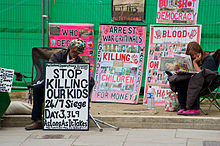
The Parliament Square Peace Campaign was a peace camp outside the Palace of Westminster in Parliament Square, London, from 2001 to 2013. [1] Activist Brian Haw launched the campaign at the site on 2 June 2001, initially as an around-the-clock protest in response to the United Nations economic sanctions imposed on Iraq. [2] His protest grew broader following the war in Afghanistan and 2003 invasion of Iraq. [3] He was joined by Barbara Tucker in December 2005, and stayed at the site day and night for nearly a decade.
Contents
Tucker carried on the campaign following Haw's death in June 2011. The London Evening Standard reported in January 2013 that Tucker had started a hunger strike after protesting in the square for a total of eight years. [4] The permanent protest camp was removed later in 2013. [5]